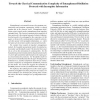Free Online Productivity Tools
i2Speak
i2Symbol
i2OCR
iTex2Img
iWeb2Print
iWeb2Shot
i2Type
iPdf2Split
iPdf2Merge
i2Bopomofo
i2Arabic
i2Style
i2Image
i2PDF
iLatex2Rtf
Sci2ools
COCO
2004
Springer
2004
Springer
Towards the Classical Communication Complexity of Entanglement Distillation Protocols with Incomplete Information
Entanglement is an essential resource for quantum communication and quantum computation, similar to shared random bits in the classical world. Entanglement distillation extracts nearly-perfect entanglement from imperfect entangled state. The classical communication complexity of these protocols is the minimal amount of classical information that needs to be exchanged for the conversion. In this paper, we focus on the communication complexity of protocols that operate with incomplete information, i.e., where the inputs are mixed states and/or prepared adversarially. We consider three models of imperfect entanglement, namely, the bounded measurement model, the depolarization model, and the fidelity model. We describe there models as well as the motivations for studying them. For the bounded measurement model and the depolarization model, we prove tight and almost-tight bounds on the output quality of non-interactive protocols. For the fidelity model we prove a lower bound that matches...
| Added | 01 Jul 2010 |
| Updated | 01 Jul 2010 |
| Type | Conference |
| Year | 2004 |
| Where | COCO |
| Authors | Andris Ambainis, Ke Yang |
Comments (0)

